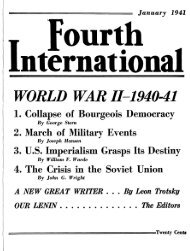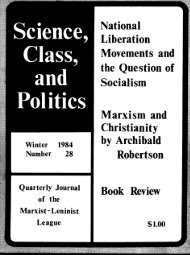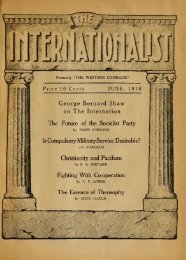The Stalin school of falsification - Marxists Internet Archive
The Stalin school of falsification - Marxists Internet Archive
The Stalin school of falsification - Marxists Internet Archive
Create successful ePaper yourself
Turn your PDF publications into a flip-book with our unique Google optimized e-Paper software.
<strong>Stalin</strong> School <strong>of</strong> Falsfification - Chapter 6<br />
not for "personal" but for party reasons. Lenin's letter, breaking <strong>of</strong>f comradely relations with <strong>Stalin</strong>, had<br />
exactly the same character. That last letter was written after the letter on the national ques tion and after<br />
the Testament. Attempts are being made in vain to weaken the moral weight <strong>of</strong> the last letter <strong>of</strong> Lenin.<br />
<strong>The</strong> party has a right to know that letter!<br />
That is how the facts stand. That is how <strong>Stalin</strong> is deceiv mg the party.<br />
DISCUSSION DURING THE YEARS 1923-1927<br />
67. During Lenin's lifetime and especially at the time <strong>of</strong> the discussions over the Brest-Litovsk peace and<br />
over the trade unions, which have since been so grossly exaggerated and distorted, the word<br />
"Trotskyism" did not exist at all.[In this connection, the fact might be mentioned that <strong>Stalin</strong> insistently proposed on<br />
the eye <strong>of</strong> the Twelfth Congress that I make the political report for the Central Committee. He did so in agreement with<br />
Kamenev, who was then the acting chairman <strong>of</strong> the Political Bureau, and with the energetic support <strong>of</strong> Kalinin and others.<br />
I declined, partly on the ground that there were differences <strong>of</strong> opinion on industrial questions. "One can hardly say<br />
differences," objected Kalinin. "In the majority <strong>of</strong> cases, your proposals are a:cepted." — L. T.] <strong>The</strong> party held that<br />
whatever occasional differences there were, they unfolded on the historical foundations <strong>of</strong> Bol shevism.<br />
<strong>The</strong> extreme opponents <strong>of</strong> Lenin on the question <strong>of</strong> Brest-Litovsk were: Bukharin, Yaroslavsky,<br />
Kuibyshev, Soltz, Safarov and scores <strong>of</strong> other old Bolsheviks, who made up the faction <strong>of</strong> the "Left<br />
communists." <strong>The</strong>y would have been legitimately amazed had it occurred to any one at that time to say<br />
that their position was "Trotskyism," especially since on all the fundamental issues which separated the<br />
Left com munists from Lenin, I was on the side <strong>of</strong> Lenin.<br />
<strong>The</strong> same must be said about the trade union discussion. <strong>The</strong> tendency to stress the administrative side<br />
grew out <strong>of</strong> the entire practice <strong>of</strong> War Communism and affected innumer able old Bolsheviks. If, at the<br />
time <strong>of</strong> the discussion, any one had mentioned such a thing as "Trotskyism" he would simply have been<br />
regarded as temporarily insane. <strong>The</strong> bogey <strong>of</strong> "Trotskyism" was projected after Lenin had withdrawn<br />
entirely from work, precisely at the time <strong>of</strong> the discussion <strong>of</strong> 1923. It was then that the "criticism <strong>of</strong> the<br />
theory <strong>of</strong> the permanent revolution" began for the purpose <strong>of</strong> stringing together the differences which had<br />
arisen on a new stage <strong>of</strong> historical development. <strong>The</strong>y engaged in a struggle against Trotsky not because<br />
he had advanced a special theory <strong>of</strong> "Trotskyism." On the contrary, the critics artificially built a theory <strong>of</strong><br />
"Trotskyism" in order to carry on the struggle against Trotsky. Some <strong>of</strong> the original critics confessed as<br />
much later on, when the groupings changed.[27]<br />
THE PERMANENT REVOLUTION<br />
68. As to the theory <strong>of</strong> the permanent revolution, I shall devote special consideration to it at some future<br />
time.[Since that time the author has published a book entitled, <strong>The</strong> Permaneat Revolution (Pioneer<br />
Publishers, New York, 1931). <strong>The</strong> exposition <strong>of</strong> the theory is therefore ommitted here].<br />
Here I limit myself to two references.<br />
In the heginning <strong>of</strong> 1918, in a brochure devoted to the October Revolution, Bukharin wrote:<br />
"<strong>The</strong> downfall <strong>of</strong> the Czarist regime was prepared by the entire preceding history <strong>of</strong> the revolution. But<br />
this down fall, and the victory <strong>of</strong> the proletariat supported by the poor peasantry, a victory which has at a<br />
single blow opened up unlimitable vistas throughout the world, is not yet the beginning <strong>of</strong> the organic<br />
epoch. . . . <strong>The</strong> Russian proletariat is confronted more sharply than ever before with the problem <strong>of</strong> the<br />
international revolution. . . . <strong>The</strong> grand total <strong>of</strong> relationships which have arisen in Europe leads to this<br />
http://www.marxists.org/archive/trotsky/works/1937-st2/sf06.htm (17 <strong>of</strong> 24) [06/06/2002 15:06:34]

















